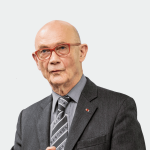[EN] Fin des avantages gratuits: Suppression des quotas gratuits dans le système d’échange de quotas d’émission de l’UE au profit de l’innovation

Depuis 2005, le système communautaire d’échange de quotas d’émission (SCEQE) est présenté par la Commission européenne comme la « pierre angulaire » de la politique climatique de l’UE. La tarification des émissions peut être un outil climatique puissant, et le SCEQE s’est révélé efficace pour réduire les émissions de gaz à effet de serre du secteur de l’électricité. Jusqu’à présent, il n’a toutefois pas réussi à déclencher une décarbonisation profonde des industries énergivores de l’UE. Les décideurs politiques de l’UE doivent désormais réformer le SEQE afin d’en faire un outil qui favorise également l’innovation climatique et la décarbonisation industrielle.
Dans un monde où plus de 80 % du PIB mondial est couvert par un objectif national de neutralité climatique, nous avons besoin d’une réforme efficace du SEQE. Celui-ci doit être aligné sur les nouveaux objectifs climatiques de l’UE et être capable de faire passer les technologies industrielles propres du laboratoire au marché afin de garantir la compétitivité durable de l’économie européenne.
Cette note d’orientation se concentre sur les quotas gratuits du SCEQE, qui sont accordés à la plupart des industries à forte intensité énergétique. Actuellement, 94 % des émissions industrielles sont couvertes par des quotas gratuits, ce qui atténue le signal du prix du carbone et, par conséquent, l’incitation à innover et à investir dans des processus de production plus propres.
Après avoir exposé le fonctionnement actuel du système de quotas gratuits, cette note d’orientation formule des recommandations sur la manière dont les décideurs politiques peuvent tirer parti de la révision du SEQE-UE pour mettre fin aux subventions à la pollution et investir plutôt dans l’innovation, afin de lancer la décarbonisation des industries à forte intensité énergétique de l’UE.







